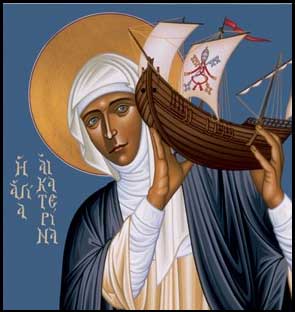Celebrating the Year for Consecrated Life with the local religious on World Day of Prayer for Vocations during the novena to St Catherine.
On Sunday the 26th April, Good Shepherd Sunday, we were joined by local religious for the celebration of Vespers followed by a get together.
Reflection
In his message for today’s world day of prayer for vocations, Pope
Francis reflects on the Exodus experience for he says "to offer one's life
in mission is possible only if we are able to leave ourselves behind” and he
continues: “At the root of every Christian vocation we find this basic
movement, which is part of the experience of faith - transcending ourselves,
leaving behind our comfort and the inflexibility of our ego in order to centre
our life in Jesus Christ. The Christian vocation is first and foremost a call
to love, a love which attracts us and draws us out of ourselves, “decentring”
us and triggering ‘an on-going exodus out of the closed inward-looking self
towards its liberation through self-giving, and thus towards authentic
self-discovery and indeed the discovery of God’ (Deus Caritas Est, 6).”
But this going out of ourselves, leaving all behind in order to put
our lives and our whole existence at the service of the Kingdom of God St John
St Catherine of Siena
Flowing from her deep understanding of God’s infinite love, her
biographer Raymond of Capua tells us that Catherine’s short life was governed
by two fundamental maxims. The first was her understanding that she was she who is not and God is HE WHO IS (L
95/6). And the second maxim follows from
the first and is contained in it: “Daughter, think of me; if you do I will
think of you.” (L 97). Raymond explains
that Catherine understood this instruction as follows: “once the soul admits
that of itself it is nothing and that its all is of God, it must of necessity
go on to place its whole reliance not on what it does itself but on what God
does. It leaves it to the Lord to take
care of it. When a soul puts all its
trust in the Lord it is not thereby absolved from doing at the same time all
that lies in its own power. Its trust in
him springs from love of Him, and it is of the nature of love to kindle in the
lover a longing to be with the absent loved-one. This, however, cannot be unless the loving
soul does its utmost to bring it about.
The more it loves. The more it exerts itself, while yet continuing to
put its trust not in its own exertions but in the workings of its Creator. This way of acting it learns through being
firmly persuaded of its own nothingness, and of the fullness of being and of
truth which exists in its Creator.” (cf L99).
Perhaps Catherine’s wisdom offers us an answer to the question which
Pope Francis posed in his message to us religious at the opening of the year
for consecrated life: “Is Jesus really our first and only love, as we promised
he would be when we professed our vows?
Only if he is, will we be empowered to love, in truth and mercy, every person who crosses our path. For we will have learned from Jesus the
meaning and practice of love. We will be
able to love because we have his own heart.”
As we are gathered here in prayer this evening let us ask for the
grace to respond to Pope’s Francis’ invitation to “wake up the world”
remembering that if we are what we should be we would set the whole world on
fire.” (cf St Catherine)

No comments:
Post a Comment